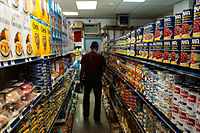
Photo from wikipedia
Emerging evidence suggests a link between young people's interest in alternative food production practices and dietary quality. The primary purpose of this study was to examine the impact of a… Click to show full abstract
Emerging evidence suggests a link between young people's interest in alternative food production practices and dietary quality. The primary purpose of this study was to examine the impact of a student-driven sustainable food systems education and promotion intervention on adolescent school lunch selection, consumption, and waste behaviors. Sixth grade science teachers at two middle schools (n = 268 students) implemented a standards-based curriculum on sustainable food systems, addressing the environmental impacts of food choices and food waste. The cumulating curriculum activity required the 6th grade students to share their food systems knowledge with their 7th and 8th grade counterparts (n = 426) through a cafeteria promotional campaign to discourage food waste. School-wide monthly plate waste assessments were used to evaluate changes in vegetable consumption and overall plate waste using a previously validated digital photography method. At baseline, the intervention students consumed significantly less vegetables relative to the control group (47.1% and 71.8% of vegetables selected, respectively (p = 0.006). This disparity was eliminated after the intervention with the intervention group consuming 69.4% and the control consuming 68.1% of selected vegetables (p = 0.848). At five months follow up, the intervention group wasted significantly less salad bar vegetables compared to the control group (24.2 g and 50.1 g respectively (p = 0.029). These findings suggest that food systems education can be used to promote improved dietary behaviors among adolescent youth.
Journal Title: Nutrients
Year Published: 2019
Link to full text (if available)
Share on Social Media: Sign Up to like & get
recommendations!